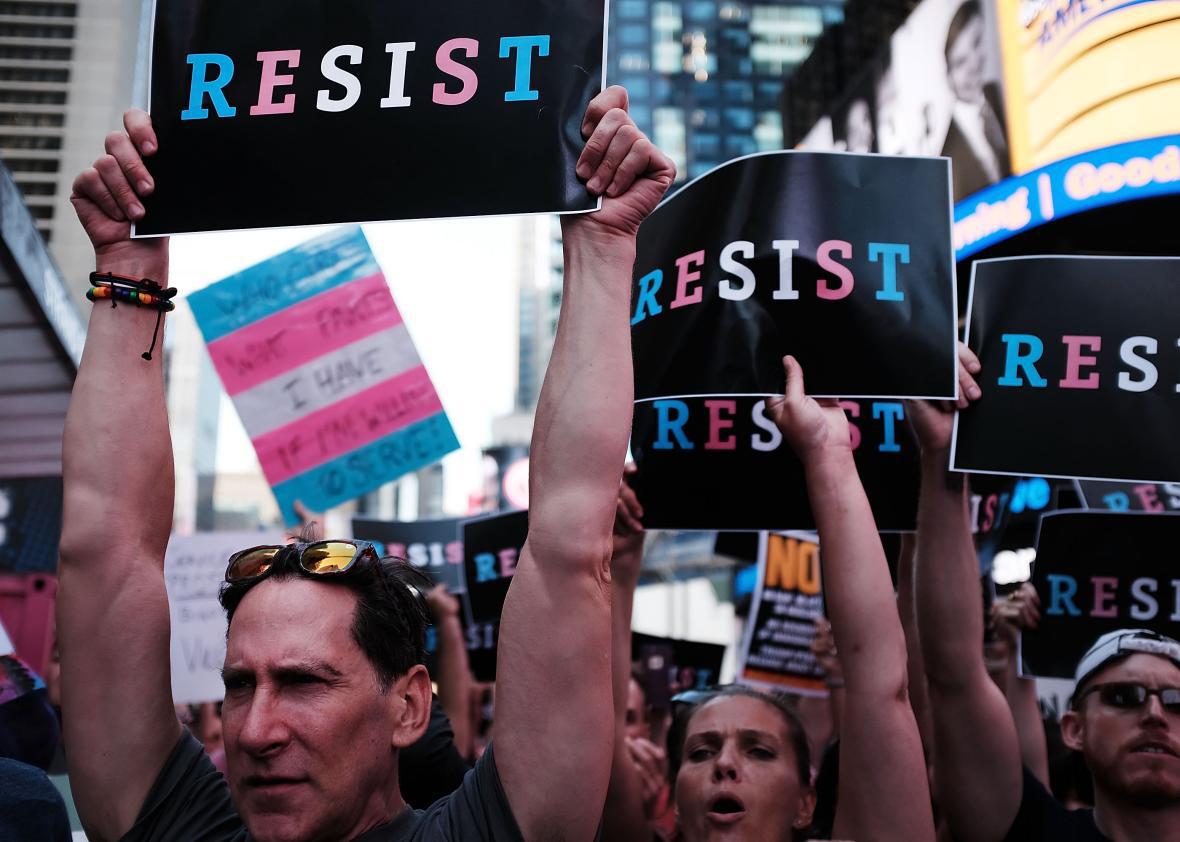Donald Trump’s discriminatory attacks on transgender people have helped define his early presidency. The president has attempted to ban transgender people from serving in the armed forces and his administration has rescinded Obama-era guidance confirming that Title IX’s protections for students include protections for transgender students. But Trump’s animus-driven actions are having the opposite effect that he envisioned. In a few different ways, Trump’s actions have inadvertently cemented, rather than weakened, the legal rights protecting transgender people.
First, by picking a fight with transgender service members and potential enlistees, Trump has all but ensured that courts evaluating the transgender military ban will ask whether the Constitution’s equal protection guarantees bar government discrimination against transgender people. Prior to this point, many cases challenging trans discrimination have raised equal protection challenges in addition to other claims. Courts have sometimes (but not always) been able to decide these cases on other bases, such as statutory grounds, avoiding the equal protection question entirely. For instance, in Gavin Grimm’s challenge to a Virginia school district’s efforts to prohibit a trans student from using the bathroom consistent with his gender identity, the equal protection challenge took a back seat to the question of whether the school’s actions violated Title IX’s prohibitions on sex discrimination in education.
But uniformed, military service members are not covered by statutory prohibitions on sex discrimination. That means the equal protection claims predominate. Therefore, courts—and the public—have been compelled to address those constitutional claims head on. And thus far, the two federal district courts to evaluate the trans military ban have easily concluded that the ban likely runs afoul of constitutional equality.
Which highlights the second way in which Trump has inadvertently advanced transgender legal rights: Because Trump’s military policy so obviously and blatantly excludes transgender people without justification, courts have had no problem holding that it likely violates equal protection—either because it is a form of sex discrimination or because transgender status is itself a protected, suspect classification. This analysis is creating very helpful trans-protective law, further establishing that transgender people are protected under the Equal Protection Clause. And it will aid transgender rights more broadly when equally pernicious but less obvious forms of transgender discrimination are challenged in courts. Indeed, this case law will support the pending constitutional challenges to discriminatory school policies that Trump has sought to undermine now that administrative guidance no longer bolsters a statutory Title IX claim.
Finally, Trump has amplified the public and judicial attention that transgender rights receive by creating a conflict with transgender people out of whole cloth. (Recall that the military had previously decided transgender inclusion presented no barrier to military readiness.) In doing so, Trump has elevated the cause of transgender rights and provided additional opportunities for public education regarding transgender identities. Put differently, by ensuring that there will be judicial and public square contestation over the constitutional rights of transgender people, Trump has contributed to entrenchment of those rights through democratic conflict.
When rights are debated in the public square, that contestation can help to root those rights in public imagination and in doctrine. For example, as Yale Law professor Reva Siegel has explained, judicial and political battles over the right to contraception, abortion, same-sex marriage, and liberty more broadly have helped to entrench those rights and ensure that they endure. Vigorous debate, though not without perils, can help rights become stronger and more deeply engrained. Transgender rights are no different.
In other words, while Trump’s anti-trans actions no doubt have negative, short-term implications for the lives of many transgender people, Trump’s actions could end up backfiring. Indeed, they may actually accelerate legal and societal recognition of transgender equality.
